Editor's Note: This article was originally published in the October issue of Chess Life magazine. Consider becoming a US Chess member for more content like this — access to digital editions of both Chess Life and Chess Life Kids is a member benefit, and you can receive print editions of both magazines for a small add-on fee.
Managing Editor’s Note: We received this text in a plain, manila envelope at our national offices. Most of our staff wanted to burn it on arrival, such was their reaction upon seeing it, but our Chess Life editor, compelled by forces he could not comprehend, has insisted upon printing it here. Therefore our advisors require us to print the following admonition: US Chess is not responsible for what might happen to you, should you decide to read the following pages. Caveat lector.
If you wish to retain your sanity (if it is still yours to lose), I beg of you not to read this. Read “Chess to Enjoy,” survey the tournament reports, but do not succumb to idle curiosity.
Do you not recall Schrödinger’s cat?

But, being human, all too human, as Friedrich N phrased it, you will not listen, but instead charge forward, paying scant heed to good advice; so be it. I will offer what meager words of warning are mine to give. Cautionary or not, here is the tail, preceded by the body.
You see, I was once like many of you.
I regarded chess as a mental battle, a vicious struggle, an intricate game of war and competition, a pitting of two minds bent solely on destruction and conquest. I was a Visigoth bent on pillage and blunder, uh, plunder.

It is only recently, and much to my contrition, that I have unearthed the truth, the secret, which has almost driven me mad (some say it has already happened) — but still I must tell someone. Unless you stop reading now, the viral nature of this knowledge will enter your mental membrane, and it might affect your rating...
I am sitting cross-legged on the polished oak floor. I am staring at a blank chessboard placed on the floor in front of me.
Ebony squares, dark as the thoughts of a misplayed gambit, and skull-white squares, calcimine in abiding time like the pure intentions of queenside castling, are these alternating squares of polished wood. Candle flame flickers about the walls, caressed by a wafting breeze which side-slips the window’s weary guard. 8 by 8. 4 by 4 by 4. The pattern focuses my mind, pulls me into a deep and cool place. Sixty-four alternating squares of light and darkness, Zoroaster.
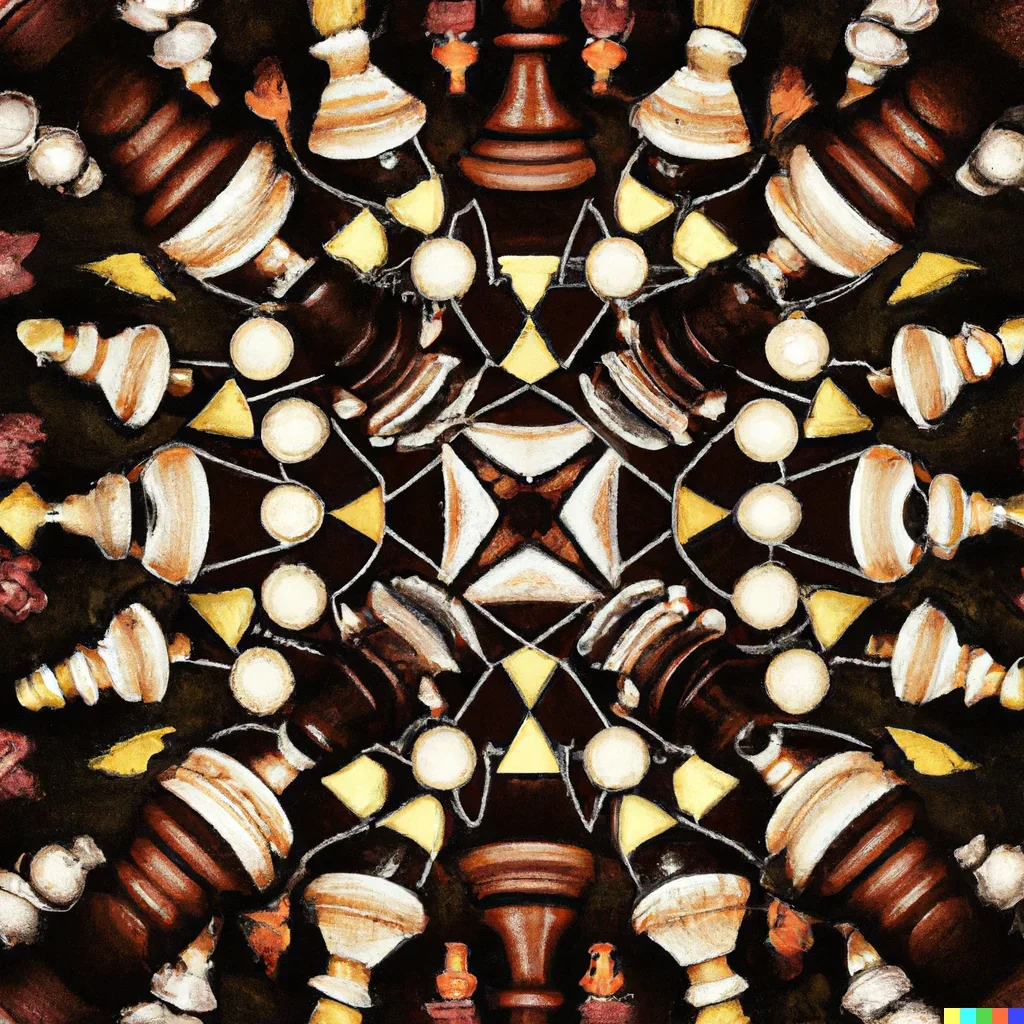
It is a mandala. Pure and simple.
Will you still need me, will you still feed me, when I’m sixty-four?
Binds, threads, gunas, strands, webs, plaits. The genetic code for every living creature on Earth consists of codons constructed in triplets from four possible bases, the bases being adenine (A), guanine (G), arcytosine (C), and thymine (T).
Four bases, combined in triplets, which is 43 and equals 64. Like the machine upon which the very first computerized chess game may have been played. Aye, aye, Commodore.
That is one hoary reference, and you might need to be 64 to get it...
And, further, humans have 23 pairs of chromosomes — 23 x 2 = 46 — which is the number 64 reversed.
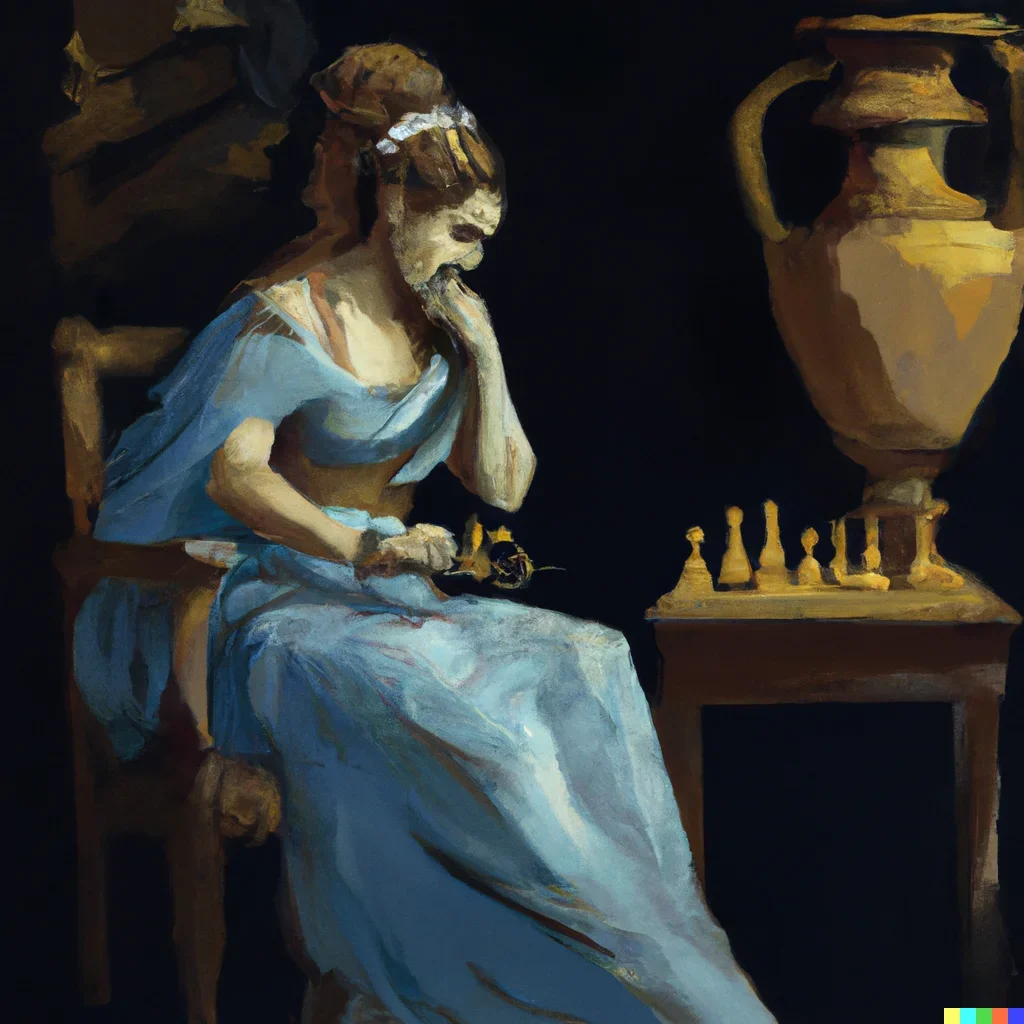
The ASCII code 64 is for the @ symbol. You know, used in every email address and online communication. Oh, and think about this — the symbol for infinity is like a sideways 8 = ∞ and 8 x 8 = 64. And the variations in any one chess match are, well, almost infinite.
Infinity starts simple in chess however — on your very first move you only have 21 possible options? No, it is 20, the experts say. But you can retire, surrender, quit, vacate the premises as one option. I am insane, not stupid. 21. But, shortly after that, exponential growth, like a government gone mad... think between 10111 and 10123 possibilities... The neo-cortex begins to fret after the first few moves as infinity looms. The mutations grow, as though evolution has run amuck, every possibility a thought, every thought possible.
You are overwhelmed with ways and paths, but just when it seems hopeless, hapless, pointless, someone will jump up and say, “There is help!”
Chess books and magazines and websites and guides and computers — they have plans to help the newcomer retain their sanity. Systems of thought. Of non-thought. Planned moves. Guidelines to assist you in not-thinking. You merely follow the pattern until your opponent, also following the pattern, misses (forgets) a “correct” move in the pattern. Then you pounce.
This seems like madness. Monkeys with maps.
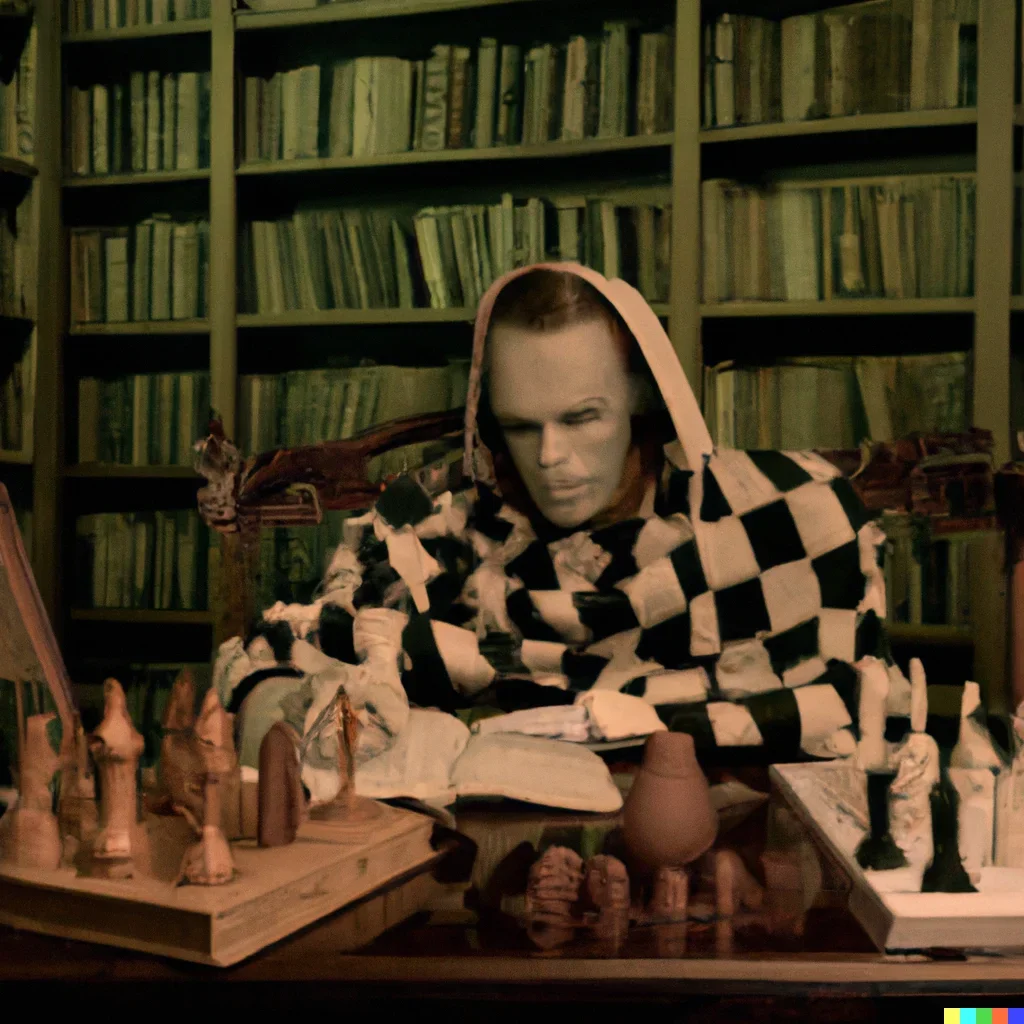
You must work past this level.
You must not get trapped into following a predetermined sequence — the mutations are there to help you, you must give free sway to nondeterministic ramblings. There must be art, style, free-flowing wonder, awe, not merely pawn-pushing slap-knee reactions, not thoughtless obedience to a script.
Chess is not designed for slaves to fashion, to technique, or to musty, antiquated ideas.
Byron says knowledge is sorrow, and he speaks truly. Remember the joy of ignorance — happily wandering your way to freedom. Move freely and abandon the map.
An octet is a grouping of eight bits. Modern computers run off a system which uses eight octets as its basis. 64-bit. Will you still feed me?
Cast the yarrow stalks, palm the dice, flip the Tarot cards, read the hexagram.
The I Ching is most ancient. Depending on to whom you talk to (and who will talk with you) the I Ching is either a system of mystical divination, a pathway to self-discovery, a guide to evolutionary change or harmless amusement.
Either way, the I Ching consists of eight trigrams (lines) in different combinations of six lines each. Thus the possible combinations available are 26 which equals 64.
In the very popular Bejeweled video game, the gems are presented in an 8 x 8 grid — hey, 64!
In the very popular video game Minecraft, you can only stack 64 of the same items into one slot.
Ancient Indian documents speak of a threefold nature in life. The sacred Bhagavad Gita speaks of the three modes of our human nature — goodness, passion and ignorance. This would be the same as thinking of each human life as being a continuum running, top-down as it were, from spirituality (goodness) through to the social and material aspects (a passion or craving for possessions) and the blind ignorance of pure physicality, where all you care about is survival and reproduction.
There are functioning rules for each level. Very chess-like. Stay with me.

At the lowest level, it is Natural Selection, survival of the strongest or, more nearly, the survival of those who best fit their niche. Only your own self-interest matters. You move your pieces without considering your opponent.
At the social or middle level the functioning rule is the so-called Golden Rule: “Do unto others as you would have done unto you.” Still a question of pure self-interest, but with an eye on the others around you. You are aware of your opponent, but they are the Other.
At the spiritual level, the functioning rule is the Hebraic Shema, Islamic Shahada or the Christic command to “Love thy G*d with all thy heart, with all they soul and with all they might.” Soul is spiritual, might is physical, and heart is social. Nafs, rooh and jism. Self-interest is constrained and actualized while considering the collective, but without losing self-identity. You and your opponent are one entity, more or less.
Any individual chess game is a snapshot, an encapsulation, of the total development of the human chess player over time.
Some people say that chess is divided into three phases. There is the Opening, the Middlegame, and the Endgame. Like consciousness, it is a continuum that runs onward...
The Opening is much like the lowest level of consciousness or nature — you merely want to survive. It is how the rankest neophyte first initiates his play. It is how we all began, even if we disavow that knowledge within five seconds of recalling it.
Level One is clearly the most ignorant — moves are made blindly or, at best, by rote, from a repertoire of conditioned responses that the beginner tries to memorize, like state capitals for a history test. Bark like Pavlov’s dog. Little thought is needed, other than pattern recognition, which is the basic skill a reptile possesses to distinguish a fly from a speck of effluvia.
At this lowest level, pieces start out with minimal support, mostly (always) on their own, striking forward to stake out scared, rather than sacred, space.
You compete within the 64 squares to grow and prosper and, if you can survive, you approach the mid-game, Level Two, by expanding your mindset to engage the social — to look beyond the mere existence of isolated pieces and to understand the threads and connections which bind the pieces. Mythological Penelope looms patiently, weaving, weaving, only to unthread it all at end of day. Hold it together.
Connected pawns make a tapestry. Reviewing games and playing actual chess against humans helps you in this phase.
Life cannot be lived in isolation, but must take fully into account the Other — not merely the other’s pieces, but the other consciousness at the opposite end of the board.
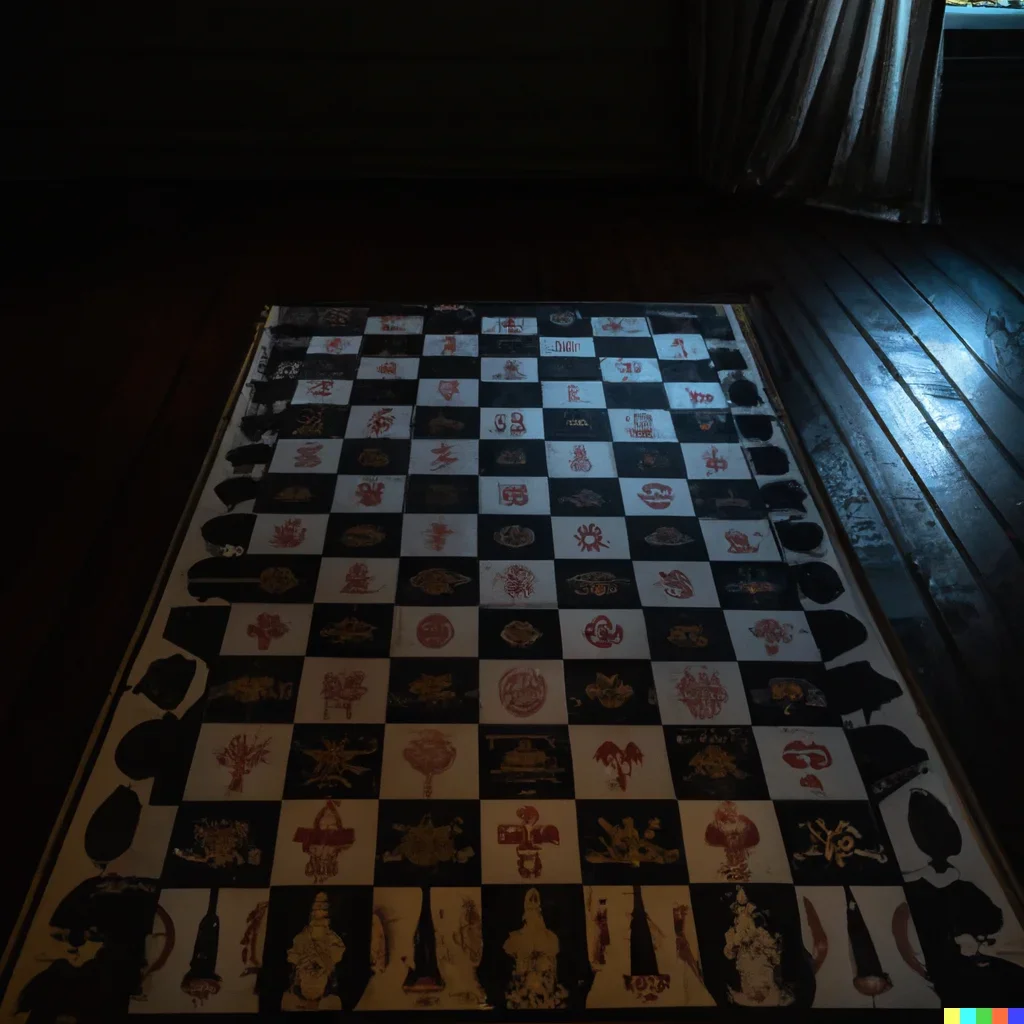
The fledgling chess player so often maintains such focus on their own pieces that they lose sight of the fact that there is another mind at the board. It is not always as clearly delineated as a simple “If-Then” programming sequence. Responses cannot be guaranteed; humans have free will, no matter what John Calvin says.
To embrace and advance to the social level of chess, one must not only add more depth and breadth to the connections among the pieces, but sense and feel the other player as a true and living consciousness, not some soulless, pattern-following, brute force embracing, algorithm-crunching, path-of-least resistance roiling and glorified calculator churning out a “reply.”
But the clever programmer, vanity of vanities, now they introduce “random errors” into the software, to make it “more human” — keep alert and see when the pattern isn’t followed. That isn’t Ruy Lopez, move eight — strike now, trained monkey, and make the move.
If you manage to achieve a true understanding of the social nature of chess, then you can, with great confidence, enter into Level Three, the spiritual and most sacred of areas.

AUM.
And it is here that, at this most refined level, you, as the player, can take on an almost godlike aura as the plans you have made and the evolutionary progress you have experienced yields a bountiful harvest in the form of the ability to achieve a position from which your evolutionary structure, the framework of your pieces, has a decisive superiority over your partner in the game, and they must formally acknowledge this.
Carl von Clausewitz (Prussia, 1832), in his treatise On War, defines War as: “An act of violence intended to compel our opponent to fulfill our will.”
But chess is not a game of violence, of conquest — if you have been playing the game this way, to utterly defeat your opponent in the game, you are at the lowest end of the continuum, playing for the pure physical conquest. You must strive to reach for Level Three, the spiritual level of the game, and must move forward to achieve true enlightenment.
In terms of nature and consciousness, the greatest artistry of the game comes not from building an evolutionary structure in isolation which defeats your opponent — quite the opposite — the greatest artistry comes when two divergent minds play the game, initially constructing their evolutionary piece structures in isolation, always moving from lowest to highest on the continuum and then, gradually, bit by bit, the two become one, the threads of the game intertwine to such an extent that all of the pieces are now related, the binding permeates throughout.
And the end is the beginning, and the outcome is a draw, a merging and a synthesis. Two participants with a new understanding, a new grasp, a perfection which cannot be garnered in isolation. To not win is to win. This is the meeting of like minds, the reflection across the board is the underlying reason for this great game — to see in the other, yourself. Your opponent is actually your partner.
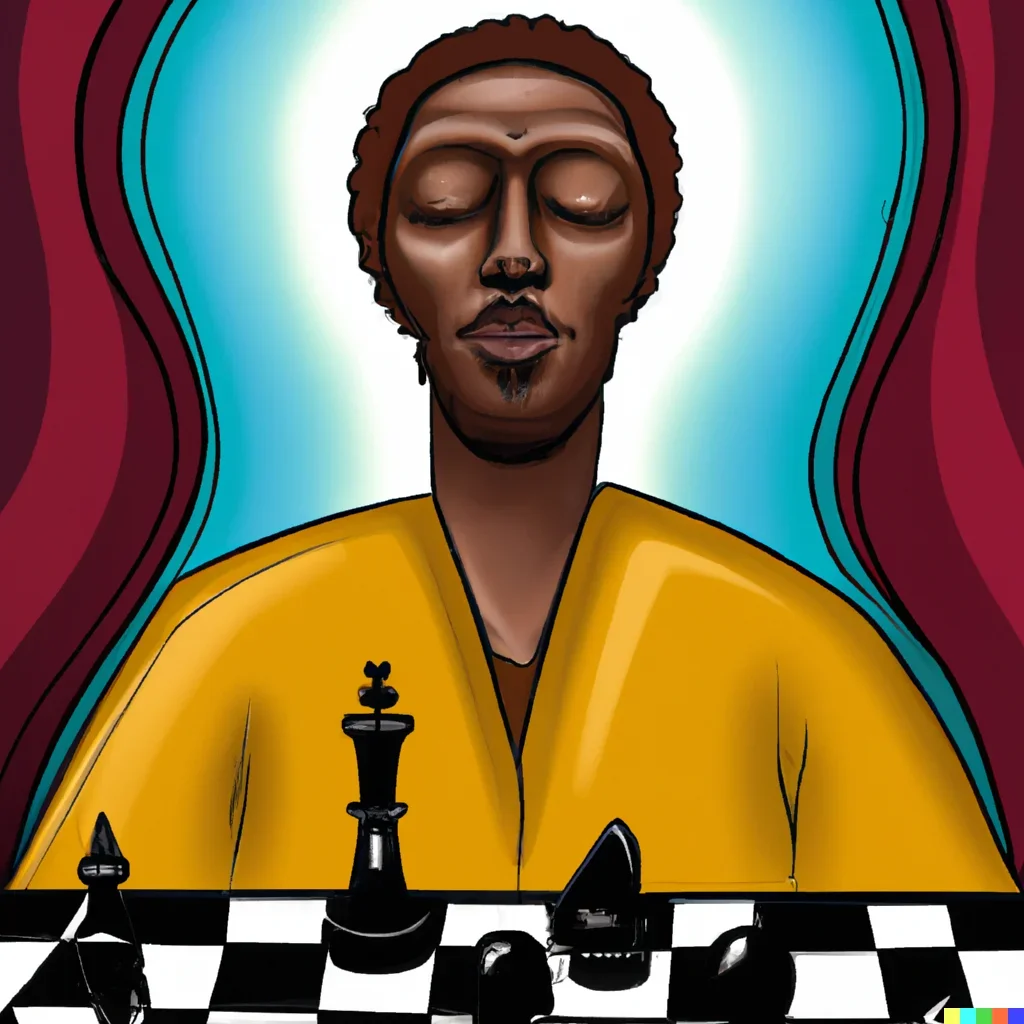
It is curious that Element 64 in the Periodic Table is Gadolinium. The initials for this element are Gd. Could stand for “good,” or possibly “God,” or it could just be a bizarre coincidence.
There are no coincidences. It is synchronicity, which is defined as “the simultaneous occurrence of events which appear significantly related but have no discernible causal connection.”
You start off playing a complete stranger. Online or in person. Do not think of them as The Other. They are not strangers and not the other — they are you, an extension of all you are and as you play the game of chess you begin to see yourself as others see you and you can start to appreciate that your actions in the game affect both you and your playing partner. As play proceeds, the thoughts and actions of both players begins to merge into a tactical and strategic dance.
Every move in chess, just like every move in life, ripples across the continuum of existence and reflects who we are as a human being.
Of course we all want to win at chess, but the joy of playing, the pleasure of problem-solving, the thrill of interacting with another mind like yours — this is the secret mystery that makes this great game so enduring.
Despite this, my mind is ablaze with pain. Even knowing this secret, I cannot put it into action. I play only to crush my fellow human player, to expose their weaknesses, to diminish their soul, to break their spirit while avoiding having my own inadequacies marched before me.
So now I am left to ponder what I should do next.
Perhaps I should consult the sages.

In this issue of Chess Life there is glorious game analysis by ascended masters, those whose fingerfehlers still crackle with purple flame. The deep waters of the endgame are plumbed by bellow-lunged free divers, revealing the transcendent beauty of rook pawns and spare tempi. Each puzzle offers a side-eyed glimpse of Caïssa in all her grace, and the book review is the work of a discriminating casuist, every word a golden link in a chain of well-hewn judgment.
And then... then, there are the TLAs.
I type the five-digit ID. Click, click, click.
The time control is fast. The prize fund is large.
It is not madness to want to play well.
I will mop the floor with those poor, unprepared fools.
Categories
Archives
- January 2026 (2)
- December 2025 (27)
- November 2025 (29)
- October 2025 (39)
- September 2025 (27)
- August 2025 (29)
- July 2025 (43)
- June 2025 (25)
- May 2025 (24)
- April 2025 (29)
- March 2025 (29)
- February 2025 (20)
- January 2025 (24)
- December 2024 (34)
- November 2024 (18)
- October 2024 (35)
- September 2024 (23)
- August 2024 (27)
- July 2024 (44)
- June 2024 (27)
- May 2024 (31)
- April 2024 (51)
- March 2024 (34)
- February 2024 (25)
- January 2024 (26)
- December 2023 (29)
- November 2023 (26)
- October 2023 (37)
- September 2023 (27)
- August 2023 (37)
- July 2023 (47)
- June 2023 (33)
- May 2023 (37)
- April 2023 (45)
- March 2023 (37)
- February 2023 (28)
- January 2023 (31)
- December 2022 (23)
- November 2022 (32)
- October 2022 (31)
- September 2022 (19)
- August 2022 (39)
- July 2022 (32)
- June 2022 (35)
- May 2022 (21)
- April 2022 (31)
- March 2022 (33)
- February 2022 (21)
- January 2022 (27)
- December 2021 (36)
- November 2021 (34)
- October 2021 (25)
- September 2021 (25)
- August 2021 (41)
- July 2021 (36)
- June 2021 (29)
- May 2021 (29)
- April 2021 (31)
- March 2021 (33)
- February 2021 (28)
- January 2021 (29)
- December 2020 (38)
- November 2020 (40)
- October 2020 (41)
- September 2020 (35)
- August 2020 (38)
- July 2020 (36)
- June 2020 (46)
- May 2020 (42)
- April 2020 (37)
- March 2020 (60)
- February 2020 (38)
- January 2020 (45)
- December 2019 (34)
- November 2019 (35)
- October 2019 (42)
- September 2019 (45)
- August 2019 (56)
- July 2019 (44)
- June 2019 (35)
- May 2019 (40)
- April 2019 (48)
- March 2019 (61)
- February 2019 (39)
- January 2019 (30)
- December 2018 (29)
- November 2018 (51)
- October 2018 (45)
- September 2018 (29)
- August 2018 (49)
- July 2018 (35)
- June 2018 (31)
- May 2018 (39)
- April 2018 (31)
- March 2018 (26)
- February 2018 (33)
- January 2018 (30)
- December 2017 (26)
- November 2017 (24)
- October 2017 (30)
- September 2017 (30)
- August 2017 (31)
- July 2017 (28)
- June 2017 (32)
- May 2017 (26)
- April 2017 (37)
- March 2017 (28)
- February 2017 (30)
- January 2017 (27)
- December 2016 (29)
- November 2016 (24)
- October 2016 (32)
- September 2016 (31)
- August 2016 (27)
- July 2016 (24)
- June 2016 (26)
- May 2016 (19)
- April 2016 (30)
- March 2016 (36)
- February 2016 (28)
- January 2016 (32)
- December 2015 (26)
- November 2015 (23)
- October 2015 (16)
- September 2015 (28)
- August 2015 (28)
- July 2015 (6)
- June 2015 (1)
- May 2015 (2)
- April 2015 (1)
- February 2015 (3)
- January 2015 (1)
- December 2014 (1)
- July 2010 (1)
- October 1991 (1)
- August 1989 (1)
- January 1988 (1)
- December 1983 (1)







